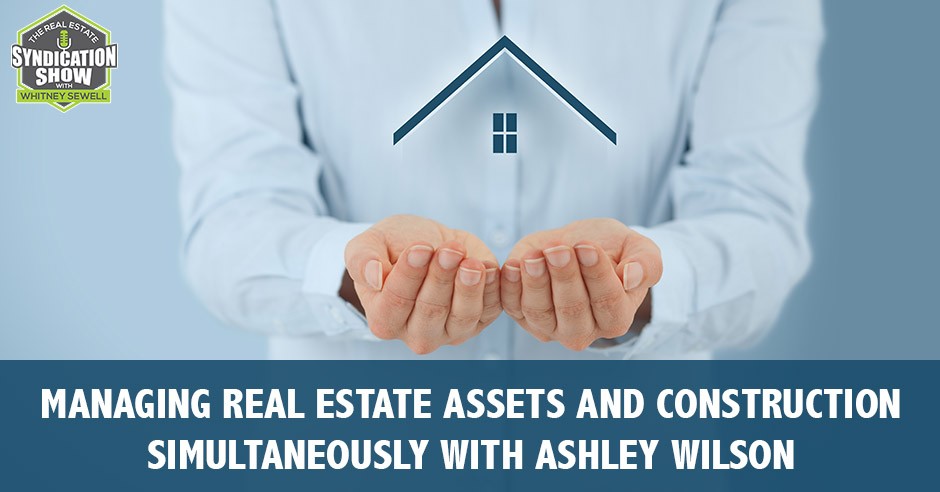Listen to the podcast here:
Did you know that you can manage real estate assets and construction at one go? With almost ten years of real estate investing experience – buying and selling over $40 million in real estate in the past five years and running nearly $5 million in renovation outside of the real estate – Ashley Wilson shares the secret formula to combining asset management and construction. Discover the solutions to the problems she has seen in the majority of syndication teams and the hardest part of the management side of that asset or construction.
Our Gracious Sponsor:
Are you wanting to learn how to gain financial freedom through having your own syndication business? Text LEARN to 474747 to begin to learn from one of the best in the industry, Vinney Chopra. Vinney came to the US with only $7 in his pocket, and now controls hundreds of millions of dollars of real estate he has acquired through multifamily syndication. He is now personally coaching others to do the same. Text LEARN to 474747 to begin your journey to starting your own syndication business! Vinneychopra.com
—
Watch the episode here:
Listen to the podcast here:
Managing Real Estate Assets And Construction Simultaneously with Ashley Wilson
Our guest is Ashley Wilson. Thanks for being on the show, Ashley.
Thank you for having me.
I’ve heard great things about Ashley before she ever got on the show. I’m excited to interview her and have her share her expertise on the show. Ashley is the Co-owner of HouseItLook LLC and Bar Down Investments LLC. HouseItLook flips primarily higher in homes in the suburbs of Philadelphia. Bar Down Investment offers passive ownership to people looking to invest in large apartments and also partners with other GP teams and runs both the asset and construction management of value at apartments. Ashley has several years of real estate investing experience, has bought and sold over $40 million in real estate in the past few years and has overseen almost $5 million in the renovation. Outside of real estate, she enjoys spending time with her family and riding horses. Ashley, thank you for being on the show. Give the audience a little more about who you are. Go ahead and tell us also how you learned this side of the business of asset management or your construction management and we’ll dive in.
First and foremost, thank you for having me on this show. I started the journey without even knowing I was starting it with my father being a general contractor. I grew up going to all different types of sites, inclusive of Section 8, multifamily, multimillion-dollar mansions and everything in between. Shortly after college, I took a position with a large pharmaceutical company managing trials and that led into managing global trials. It ultimately led to managing teams on a global capacity. I learned very quickly how to operate from afar. For the past few years, I lived in Europe. While living in Europe, I partnered with my father who’s a general contractor and started HouseItLook, the flipping company. I would run everything from helping set the schedules to even design, which a lot of people find intriguing.
We utilize technology, leveraged FaceTime and a lot of different resources to be able for me to design the projects while living in Europe and my dad being the boots on the ground. I also did all of our accounting, our social media, anything to make my dad’s job easier so he could focus on the day-to-day operations of flipping these homes. We moved back from Europe a couple of years ago. My husband and I decided we wanted to diversify our investment strategy and add multifamily to our portfolio. We started researching multifamily years before that. That’s how we landed on multifamily when we were trying to figure out what was the most advantageous play for our investment comfort level and our knowledge and experience. We thought multifamily was the best fit for us. We started having conversations with different people that were in that space. We often found that people needed people to raise capital, which was a huge entryway into partnering with multifamily.
[bctt tweet=”People can get a little bit greedy on the GP pie. They’re afraid to give up pieces of the pie thinking they’re giving up their profit.” via=”no”]
That’s neither mine nor my husband’s comfort or expertise. We needed to figure out a way how we could partner and get our foot in the door without raising capital because that was not something we wanted to focus on. What we realized was a lot of these teams lack someone with construction experience. The way that we first partnered on the first deal we did as a GP was via a construction management role. That is definitely different than the way most people get into multifamily because most people get their taste of multifamily by raising capital and becoming part of the GP that way. For us, we were even able to raise capital because of that because people saw us being very involved in the project and the overall day-to-day conduct. They had a lot of trust in us and want to invest with us because they knew that we would be in the day-to-day operations. Initially, it was supposed to be in a construction management capacity, but it has snowballed into asset management. From there, we now also have another property that I’m managing construction and asset management on. That’s a fair bit larger property but also within Texas too.
It’s impressive that you’re in Europe and you’re managing all these systems for HouseItLook in Philadelphia. You were able to develop those systems. You’re able to provide lots of value to your father by being able to do all that and all the designing. That took some time, some skill and some drive, no doubt about it. It’s incredible to that you found you had a skill and you found a way to get into this business by using your skill. A lot of people struggle with, “How do I get started? Do I start by trying to raise capital?” It’s whatever that may be.
You had a skill and you were able to leverage that in a big way and get started. Let’s get into construction management and asset management. I’d love for you to get a start a little bit, maybe at a higher level what that is. We’ll get into maybe some mistakes people make or some things we need to be thinking about. Maybe as the deal sponsor some things that we need to go through and know about after we sign or we close on a property, what happens on the asset management, construction management? Get us started what that is, what those roles mean, and then let’s go from after we close on a property or before.
Before I got into the nitty-gritty, I was in the trenches. I used to think that construction management and asset management were two independent roles that should have been fulfilled by to support people. Now that I’m in the second project, I see that the roles can be combined. It can be one person managing both asset and construction management. The problem and what I have seen historically is the majority of syndication teams don’t have someone who is experienced in construction management. They outsource that piece. Personally, I don’t think that is a very good way to run syndication. There are a lot of reasons why. Most notably is because I don’t believe that your interests are aligned. Construction management fees are paid off of a percentage of the total construction costs. If your construction cost increases, if you’re an outsource construction manager, you’re happy about that because your fee increases as well compared to if you are a construction manager who is a partner of the deal in a GP. The construction costs are as much as that increases, that takes away from your overall valuation of the property and also to your profits, let alone all of the investor profits too.
The construction fees are paid off of the total construction costs. That’s not an alignment of interest at all.

A lot of people miss that. A lot of people are willing to give up that piece because they don’t have a familiarity with construction. They think that outsourcing it to someone who’s more knowledgeable about construction is the most advantageous way to go. This might not be a well-like comment that I’m about to say, but it’s true. People get a little bit greedy on the GP pie. They’re too afraid to give up pieces of the pie because they think they’re giving up their profit. What they should be thinking is what the most advantageous way to divvy up this pie is to yield the greatest return. It’s a very short-sighted solution to outsource construction management. It’s not a long-term play when you’re in a long-term business. When you’re doing syndications, buying large apartment buildings and you’re especially doing the value-add play three to ten-year exit, that’s a marathon. That’s not a sprint.
Looking for these ways to shortcut the GP ownership shares, it’s not in your best interest because you forget about the power of the cap rate and the power that the NOI has on the overall valuation. If people are more willing to give up a piece of the GP for a partnership, that exponentially will come back to everyone including the GP and the LP in terms of their returns at the sale. That’s something that isn’t thought through, but it comes down to basic mathematics. Going back to your original question, when I originally started, how I thought the two were independent of each other. Now that I’m in the thick of it, I realized that a construction manager needs to understand the business side of the entire project, the project hold, the market demographics.
What the market wants, what cycle they’re going through, what rates they’re paying, what are the current occupancy levels, what are the amenities that people want? They need to understand that. They need to balance the cap ex budget that way. If the initial plan was to put in a playground. By the time you purchased the property, playgrounds aren’t the latest and greatest rage that people are seeking out when looking for an apartment in that class property. You have to be very nimble and able to pivot and able to manage that budget. You also do have to have the wherewithal to know that. That’s why the two roles if you get the right person, can be one person to execute both.
There are even some operators now that don’t understand the market that they’re investing in, especially if it’s at a distance or a market they’re not familiar with. They’re trying to be the asset manager. I also wanted to go back. You mentioned about being so worthwhile to pay this person who’s an expert, asset management, construction management. It makes so much sense. The operators that are reading and they’re thinking, “This could be a team member that we need to hire. We need to find somebody for this role.” What should I be thinking? What’s it going to cost us?
I get this question a lot because we get approached a lot to partner with people. My best answer, whether you decide to partner with us or anyone else, it’s not a one-size-fits-all answer. It depends on your plan because, for example, if you have $1 million cap ex and you have 100 units. That $1 million cap ex is going to renovate all of those units and provide exterior amenities. That’s a lot of busy work. That’s a lot of estimates collecting, negotiating and follow-up. It’s very work-intensive where let’s say, for example, you have a 600-unit property and you have $1 million cap ex. You’re redoing the roofs, the asphalt and the driveway. You’re adding a playground and resurfacing the pool and maybe putting in a new pool liner. That could easily eat up $1 million across that size property, but it’s not the same level of work.
[bctt tweet=”When looking for an apartment, you have to be very nimble and able to pivot and manage your budget.” via=”no”]
You need to understand how many projects you’re doing and the type of property it is. For example, if it’s a class A property and you’re using the cap ex for fluff-type work as opposed to a 1960s, ’70s vintage. You’re dealing with a lot of mechanical issues, which are more challenging to deal with. I definitely think there isn’t a flat rate as to what should be paid. If you’re looking for someone, who is managing asset and construction management, you’re easily going to be giving up anywhere from 20% to 35% of the GP for someone to take on that responsibility. That’s the other thing too, when you have someone doing both, you can combine the fees. I’ve seen fee structures that collectively go up to 40% to 45% because they’ve broken up the two roles. That’s why people get turned off as to hiring a construction manager because they see this add on a fee on top of an asset management fee. They think they can get it cheaper through outsourcing. That’s why I always say, “You might get it cheaper initially, but in the long-term, you’re costing not only the rate of paying that person, but the total evaluation of the property is being hit by that as well.”
Hiring someone like you or if we’re looking for somebody like you, obviously if you’ve got experience in construction, you’ve got experience in other types of management, those are great things. Any other types of questions we should be thinking about to asking somebody like you to make sure they’re qualified for this position. It’s a lot to say, “We’re going to bring you into this partnership, bring you into the GP. You’re in this deal now for the life of this deal.” Is there anything else that we could use to make sure they’re qualified to try to manage the construction and the asset side of this business?
The number one thing that you should do with any role that someone’s going to fulfill is asked for references. People should have references on a 360 platform, not one platform. For example, when I say they should have references on a 360-degree platform, what I mean is that you shouldn’t be asking for references from previous partners that they’ve worked with. You should be asking references of partners they’ve worked with, a property management company they worked with and the contractors that they’ve worked with before. If they didn’t provide you references on all three of those platforms, I would be a little weary on what type of relationship they had with each component because it’s easy to make one of those groups happy at the detriment of the other two relationships.
It takes someone who is good at what they do to be able to balance all three and keep them in harmony. At the end of the day, if all of those three components aren’t working well, the project is the thing that suffers. That’s the number one thing that I would say to someone to check for references to make sure. You have to ask them questions especially if they’re running asset management. They need to understand the business. If they don’t understand the questions that you’re asking. Multifamily, they don’t understand the terminology. They don’t understand your business plan. If they’re not asking you for a copy of your underwriting, run for the hills because that to me means that they have no wherewithal even to know where to begin. They think, “I’m going to be given a budget and I’m going to execute X, Y and Z,” which to be honest with you is no different than outsourcing it because they’re doing the same thing. What you want is someone who understands all the nuances as to why you are doing something, not what you are doing. That is the game changer in the business.
You’ve already provided such great information. I’d love to have you back and go through some actual steps of your day-to-day operations and things like that. We could cover some systems and routines that you’ve put in place that’s helped you to be a good manager on the construction and asset side.

I am a little OCD in the sense that I like to be extremely organized. I like having trackers for absolutely everything. I like developing tools from day one. I constantly modify those tools. I never consider any of my documents to be final and nor do I consider the way I’m doing something to be the correct way to do something. I’m sure many years from now I will say the exact same thing. I like to educate myself constantly. I encourage everyone to constantly educate themselves because there’s always a better way to do something. What I do is from day one, when I started working on that first project I had, I literally created multiple trackers. I was trying to organize all of this information. Also, I believe that the success of anything in life boils down to communication.
You are making sure that you have appropriate touch points with the key players that are needed to be kept in the loop. Everyone talks about communication to your LP investors, but no one focuses on the communication within the team that is running the property. Having regular contacts with your property management company on the takeover, there’s going to be communication outside of that weekly call. However, you should still, no matter what, have a weekly standing call to make sure everything’s on the same page. You have notes that are documenting the progression of that ownership. For example, I take minutes at every single meeting that I do. Those minutes are shared with anyone who wants access to them. The GP always has access to these minutes and so does our property management team. They can reference the minutes.
We do a shared screen on those weekly calls so everyone can see exactly what is being typed in for the minutes while the conversations are being had. It’s very crystal clear as to what action items are needed for the next steps. As long as you continue those communications, I also have a separate touch point with the GP team weekly to make sure that we’re always on the same page too. I fill them in what is transpired across the week. The beginning of the week is with my property management team. At the end of the week is with the rest of my partners. We always are on the same page. Everyone is kept up to date. Now people can be involved as much as they want or not involved, but as long as they have access to all the information, that’s critical.
What’s the best way you’ve found to communicate with this team? I know you mentioned Zoom. Are there any other ways or systems that you’ve created or come up with and said, “This works well for us?”
We also utilize Slack. Slack is the hot topic right now. Everyone is utilizing Slack because of the ability for the different channels, adding people into channels and being able to search through Slack, go through the history of conversations. It’s a good tool to be updating pictures and sharing content that way. I use that across all of my teams and across other people within multifamily that I’m having conversations with too. It’s an easy platform to communicate as opposed to a text message because everyone’s already within the appropriate channels. You can speak to specific topics and drill it down that way or you can have it by the project. You have the flexibility to be whatever you want it to be.
[bctt tweet=”Continue to educate yourself because the one thing that’s constant in this world is that everything is always changing.” via=”no”]
Any other routines that keep you on the check? There are so many things that you’re tracking. What are a few things that we must be tracking?
At the beginning of the takeover, you should always have a checklist of the items that you want to address, right from the takeover and the status of those items. We could probably have multiple shows on the checklist of the items that you need to take care of at takeover. From there, you need to make sure that you’re understanding of the loan terms and what those requirements are, if there are certain actions needed to be taken by a certain date. You are making sure that all the information can be viewed in one location.
What I do is I create a property tracker and that tracker has multiple tabs on it. Instead of someone having to go to multiple documents, they can go to this one tracker. That tracker has, for example, how much our rent was at acquisition versus what it is now. We can see the progression there. We can see how many units are renovated and what renovations we did because I believe in having more than one level of renovation that helps with market absorption. We can see cap ex, what the initial budgeted cap ex items were, what was budgeted, what the initial scope was, what’s the scope now because that changes as well. Not only during the whole period while you’re under contract, but while you own the property too. A lot of different tests that need to be coldly weighted in one location.
What’s been the hardest part of the management side of asset or construction? What’s been the hardest part of that side of the business for you?
The hardest part is when you know something needs to be done. I’m a believer that you should have multiple estimates without taking the scope of work, copying it and sending it to someone and having them give a value to that scope of work. I believe that when you have someone come out, they should not only give you their idea of the price but the ideas to how that issue needs to be resolved. That’s taking it one step further because if you take the scope of work and you send it to everyone else, everyone is going to bid apples to apples. That’s what ideally you want. At the same time, you want someone who’s also very creative thinking and understanding what your business plan is for that project. I know this is horrible to say, but everyone says this in the business whether they want to say it on a recording or not. I’m not looking for a solution that’s going to last. It’s going to be there 50 years from now.

I’m looking for a solution that’s going to be there ten years from now or a shorter period of time because we don’t have the capital to put solutions in for 50 plus years on these projects. In order to do something like that, that takes time. That can be a little frustrating to me because I like to move pretty quickly. When we take over a property, you have obviously the new tenant base you want to attract, but you also don’t want people leaving out the back door either. You want to keep the people on the property, still happy with what’s going on. You want to show them right away that you’re making all these changes when you first take a property. It’s hard to do that initially. That can be a little bit challenging getting that all organized and getting those bids quickly in and executing them so you can make the transition as fast as possible.
What’s been the number one thing that’s contributed to your success?
The number one thing that has contributed to my success is education. My grandfather when I was very young, always said to me, “There’s one thing someone can never take away from you and it’s your education.” He was a huge proponent for continuing to educate yourself. No matter how old you are, no matter how experienced you think you are, but you continue to educate yourself because the one thing that’s constant in this world is that everything is always changing. I have taken that to heart. I read all the time. After university, I went and got my Master’s full-time while working full-time. I constantly am trying to educate myself on every little nuance of the business so I can be an extreme asset to anyone who wants to partner with us or even to the limited partners who want someone very well-versed on how to handle the property.
How do you like to give back?
I like to give back a lot of different ways. Within the real estate world, I cohost the investor’s subgroup of Philadelphia, in the suburbs of Philadelphia. It’s located in Conshohocken, Pennsylvania for any women real estate investors looking to invest or learn about any aspect of real estate. It’s not specific to multifamily. That’s what I do on the real estate realm. I also am the chair of my alma mater Colgate University for my class. I volunteer there. I don’t even know how many hours a year, but it’s a lot. I do a lot of volunteering there. Historically, I’ve volunteered for a lot of charities. I can’t even tell you how many charities, but a ton of different charities ranging from children’s organizations to hospitals, animal rescue centers. I’m diverse in how I like to give back because I feel that there are so many different organizations that need our support. I’m trying to help out as much as I can across those organizations.
Thank you for sharing that. Tell the readers how they can get in touch with you and learn more about your company.
With respect to our flipping company, it’s HouseItLook.com and with respect to our multifamily company, it’s in InvestBarDown.com.
Ashley, thank you so much for being on the show. I look forward to having you again. I’d love to go do some more details of those checklists you were talking about in details of taking over the property and things you’re looking for and doing. I appreciate the readers being with us every day. I hope you all will go to Life Bridge Capital and also connect with me. Join the Facebook group.
Important Links:
- HouseItLook LLC
- Bar Down Investments LLC
- Slack
- Facebook – The Real Estate Syndication Show
- HouseItLook.com
- InvestBarDown.com
About Ashley Wilson

Ashley has almost 10 years of real estate investing experience, has bought and sold over $40 million in real estate in just the past five years, and has overseen almost $5 million in renovation. Outside of real estate she enjoys spending time with her family and riding horses.
Love the show? Subscribe, rate, review, and share!
Join the Real Estate Syndication Show Community:



